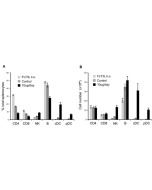Cookie Policy: This site uses cookies to improve your experience. You can find out more about our use of cookies in our Privacy Policy. By continuing to browse this site you agree to our use of cookies.
Chimerigen
FLT3 Ligand (human) (rec.) (His)

| Product Details | |
|---|---|
| Synonyms | FLT3L; FMS-like Tyrosine Kinase 3 Ligand |
| Product Type | Protein |
| Properties | |
| Source/Host | HEK 293 cells |
| Sequence |
Human FLT3L (aa 27 -184) is fused at the C-terminus to a His-tag. |
| Crossreactivity |
Human Mouse |
| Biological Activity |
The ED50 was determined by the dose-dependent stimulation of the proliferation of human AML5 cells is ≤ 1.0 ng/ml, corresponding to a specific activity of ≥ 1 x 106 units/mg. |
| MW | ~25kDa (SDS-PAGE) |
| Purity | ≥95% (SDS-PAGE) |
| Endotoxin Content | <0.001EU/μg purified protein (LAL test; Lonza). |
| Reconstitution |
Reconstitute 10µg vial with 100 µl sterile water to a concentration of 0.1mg/ml. Reconstitute 50µg vial with 100 µl sterile water to a concentration of 0.5mg/ml. Add 1X PBS to the desired protein concentration. |
| Formulation | Lyophilized from 0.2μm-filtered solution in PBS. |
| Other Product Data |
NCBI reference AAI26294.1: FLT3L (human) |
| Shipping and Handling | |
| Shipping | BLUE ICE |
| Short Term Storage | +4°C |
| Long Term Storage | -20°C |
| Handling Advice |
Avoid freeze/thaw cycles. Centrifuge lyophilized vial before opening and reconstitution. PBS containing at least 0.1% BSA should be used for further dilutions. |
| Use/Stability |
Stable for at least 1 year after receipt when stored at -20°C. Working aliquots are stable for up to 3 months when stored at -20°C. |
| Documents | |
| Product Specification Sheet | |
| Datasheet |
 Download PDF Download PDF |
FMS-like tyrosine kinase 3 ligand (FLT3L) acts as a growth factor that increases the number of immune cells (lymphocytes (B cells and T cells)) by activating the hematopoietic progenitors. It binds to FLT3 (CD135) which is found on multipotent progenitor (MPP) and common lymphoid progenitor (CLP) cells in mice. FLT3L induces the mobilization of the hematopoietic progenitors and stem cells in vivo which may help the system to kill cancer cells. FLT3L is crucial for steady-state pDC (plasmacytoid dendritic cells) and cDC (classical dendritic cells) development. Deficiency of FLT3L causes a dramatic decrease in DC numbers, whereas increasing its availability increase in DC numbers.






